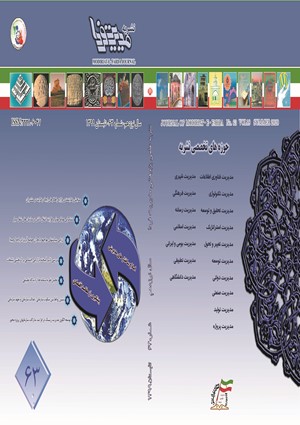Universal Banking Modeling Based Staff Empowerment
Subject Areas :hamidreza kazemi 1 , naser hamidi 2 * , babak hajikarimi 3
1 -
2 - Islamic Azad University
3 -
Keywords: Universal banking Lingo Linear Programming , FGTMA-FDEMATEL . Empowerment,
Abstract :
Nowadays, industries, especially the banking industry, are facing a much more complex environment than the past decade. Therefore, they have to adapt to the environment to obtain and maintain their competitive edge. The traditional banking system is no longer efficient enough, while a universal banking system can provide more varied services to a more diverse clientele. Considering the radical humanist paradigm in the analysis of social theories and a focus on the effectiveness of capable human resources for the correct implementation of universal banking in Iran, the present paper aims to propose a universal banking system focusing on the empowerment and skill development of bank employees. This study used the Delphi fuzzy method to select experts and classify and analyze their responses. Further, the Linear Programming and , FGTMA-FDEMATEL and screenwriting method was used to identify and investigate the criteria correlationsand map the network relationships. Arobust statisticalmethod was used to solve optimization problems based on data uncertainty.and lingo software was used to solve the problem. The results drawn from the model indicated that factors such as employee decision-making ability, responsibility towards executing a decision, access to decision tools, and employee self-efficacy sources influence the empowerment of employees and correct implementation of private, corporate,business, and investment banking. Further, they showed that sense of competence, motivation, participation, sense of effectiveness, and information technology influence universal banking. In addition, training and reward influence all types of universal banking
Abtahi, S. (1996). Human Resources Management. Payam Noor University Press.
Athanassopoulou, P., John, A. (2004), Effective Communication with Leading Customers in Developing New Banking Products. International Journal of Bank Marketing, 22 (2): 100-125.
Fornell, C., &Larcker, D. F. (1981). Evaluating Structural Equation Models with Latent Variables and Measurement Error. Journal of marketing research, 18(1), 39 – 50. [
Fornell, C., &Larker, D. F. (1981). Evaluating Structural equation models with Latent variables and measurement error. Journal of marketing research, 18(1), 39 – 50.
Fornell, C., &Larker, D. F. (1981). Evaluating Structural equation models with unobservable variables and measurement error. Journal of marketing research, 18(1), 39 – 50. [
Mohaqeqnia, M.,Shahriari, M., Ahmadi, M., Ahmadi, R., Sargolzai, M. (2014). Examining the Challenges, Reforms, and Successful Experiences of Universal Banking in the World and Envisioning the Future Prospects. 5thInternational Conference of Bank Services Marketing.
Hasanqolipoor, T.,Hashemzehi, A., Sajedifar, A. (2013). A Strategic Approach to Customer Orientation in Banking Industry. 10th International Conference of Strategic Management. Tehran, Iran’s Association of Strategic Management.
Bentler, P. M. (1990). ComparativeFit Indexes in Structural Models. Psychological Bulletin, 107, 238- 246.
Davari, A., Sanei, M., Roozban, F, Davari, E. (2014). Human Resources Competencies in Universal Banking. 5thInternational Conference of Bank Services Marketing.
Khajesalehani, M. (2014) Providing Services for Universal Banking Clients by Identifying and Prioritizing the Clients Based on Professional Marketing Approach. 5thInternational Conference of Bank Services Marketing.
Danai, H., Qaribtarze, Z., (2012). Investigating the Relationship between the Decision-Making Approach of the Heads of Islamic Azad Universities and Their Organizational Performance in Region 9. The Financial Conference of Entrepreneurship and Management of Knowledge Businesses. [
Mashhadi, M. (2010). Competence in Human Resources Management. Tadbir Journal. Vol (215).
Momeni, M., &Fa’alqiomi, A. (2007). Statistical Analysis via SPSS. Tehran, KetabNou Pub., 1st Ed.
Thomas, K.W. &Velthouse, B. A. (1990). Cognitive Elements of Empowerment: An Interpretive Model of Intrinsic Task Motivation. Academy of Management Review,15: 66-681

